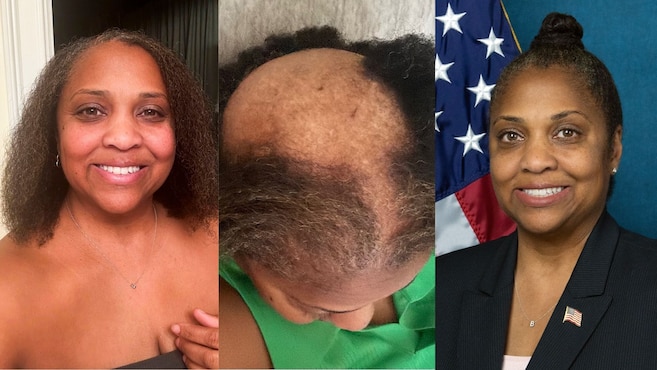
Belinda Robinson always had thick natural hair and treated it gently, without harsh chemicals.
But one day about 17 years ago, she noticed a small smooth spot on the back of her head. After several more years of thinning, she was diagnosed with a kind of alopecia, the general term for hair loss.
“When I was first diagnosed I cried, I really cried; it was hard to swallow,” said Robinson, now 53 and an adjunct professor and federal employee who lives in Northern Virginia. “Now that I’m more educated on what I have, I know a lot of folks are going through the same thing.”
Alopecia affects millions of Americans, and while sometimes hair can grow back on its own or with treatment, Robinson had a permanent type suffered mostly by Black women called central centrifugal cicatricial alopecia.
After several other dermatologists were unhelpful, in 2022 a friend directed her to a doctor in Baltimore who was testing a hunch that a treatment was hiding in plain sight.
Dr. Crystal Aguh, a dermatologist and director of Johns Hopkins Medicine’s ethnic skin program, asked Robinson to join about a dozen Black women taking a diabetes drug called metformin to see if it could slow or reverse hair loss. Aguh knew the form of alopecia Robinson suffered becomes permanent when hair follicles are destroyed by scarring in the scalp tissue.
There is similar scarring in the organs of diabetic patients.
“Has anyone tried to attack the scar tissue in the scalp?” she wondered. “We had to give women a better chance to get their hair to grow back.”
Aguh said hair loss has a significant impact on quality of life. She said studies show almost 10% of women needing to undergo chemotherapy will refuse chemo because of the prospect of alopecia. “Devastating is an understatement,” she said.
Aguh said alopecia comes in two categories. One is the non-scarring kind that can be reversed with time, like chemo-induced alopecia, and others that can be aided with drugs like Rogaine. The most common type is alopecia areata that actress Jada Pinkett Smith says she suffers from, along with about 7 million Americans, according to the National Alopecia Areata Foundation.
Then there is the scarring kind that Robinson has. Central centrifugal cicatricial alopecia is the most common of this type and likely has a genetic component. Aguh’s previous research shows up to 15% of African American women suffer from it.
She turned to an “off-label,” or unapproved, use of metformin, used to address the faulty regulation of insulin, the hormone that manages blood sugar and helps stop scarring of organs. Aguh’s prior research suggested insulin resistance was playing a role in scalp scarring, too.
Metformin is a relatively cheap drug long on the market and considered safe for long-term use. Aguh had her patients use a low-dose cream directly on their scalps.
After six to eight weeks, she saw changes to samples from the patients’ scalps under a microscope. After six months, nine had improvements to their scalps and six had some hair regrowth. She described the findings in the Sept. 4 issue of the journal JAMA Dermatology.
Robinson’s hair loss stopped and she saw some “peach fuzz” on the bald spots.
Aguh now says there will need to be formal clinical trials, the process of testing a drug and gaining approvals from the U.S. Food and Drug Administration. That will answer questions about how much to take, in what form and for how long. Studies may also show whether the drug reverses other types of hair loss.
Normally, patients have to wait out the yearslong testing process. But Aguh said given the safety of the drug in low doses, it can be prescribed now after some blood work to check for conditions such as kidney disease, where it should not be used.
“I’m a scientist but a person first,” she said. “I want people to get better. If I’m retired from the hair clinic because no one has hair loss, that would be great.”
Robinson said the metformin study has given her hope, and she plans to continue taking it. She’d like to avoid wearing a wig or weave or other measure that she just doesn’t feel suits her. For now, she mostly wears her hair in a well-placed bun while working.
She says she’s proud to have been a part of the initial study and wants it to lead to a cure. She also wants other sufferers to know they aren’t alone.
“This happens to people of all ages and demographics,” she said. “There is help out there. My advice is to find fun ways to do your hair, explore wigs, hats, scarves. There are a lot of ways to accessorize your scalp.”
This post was originally published on this site be sure to check out more of their content.








